100 Women: Does having a woman behind the wheel stop harassment on public transport?
- Published
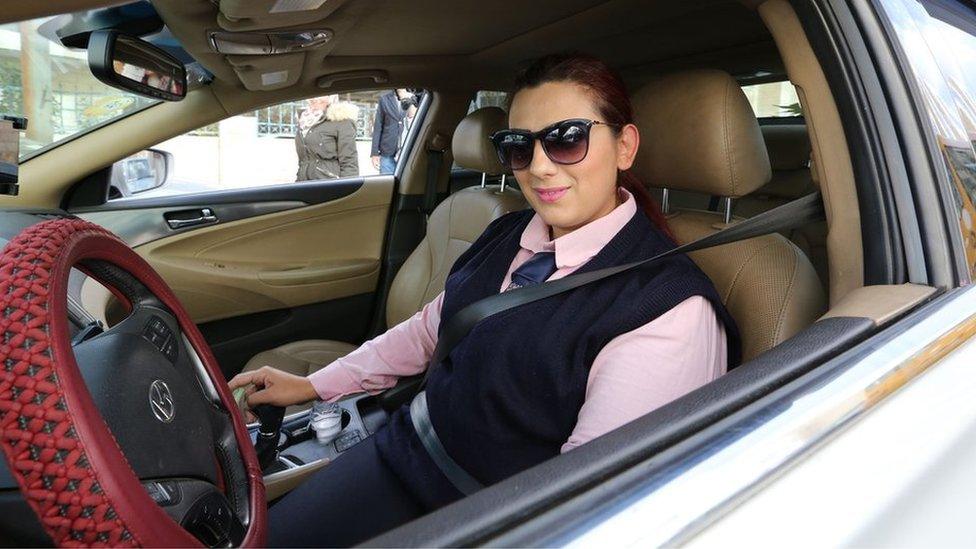
A female taxi driver in Jordan: a rare occupation for women in some conservative Muslim societies
Most women and girls around the world either have experienced or will experience harassment in public spaces, statistics show - and public transport is a hotspot for these abuses, from whistling and vulgar comments to sexual touching and assault.
Different solutions have been implemented around the world to tackle the problem.
There are segregated carriages in trains, "pink taxis" for female passengers, safe booths in public transport networks to confidentially report cases, and a variety of awareness campaigns.
But does having a woman behind the wheel offer any protection?
100 Women asks female drivers in buses, trains, tubes and taxis, as well as activists and policy experts.
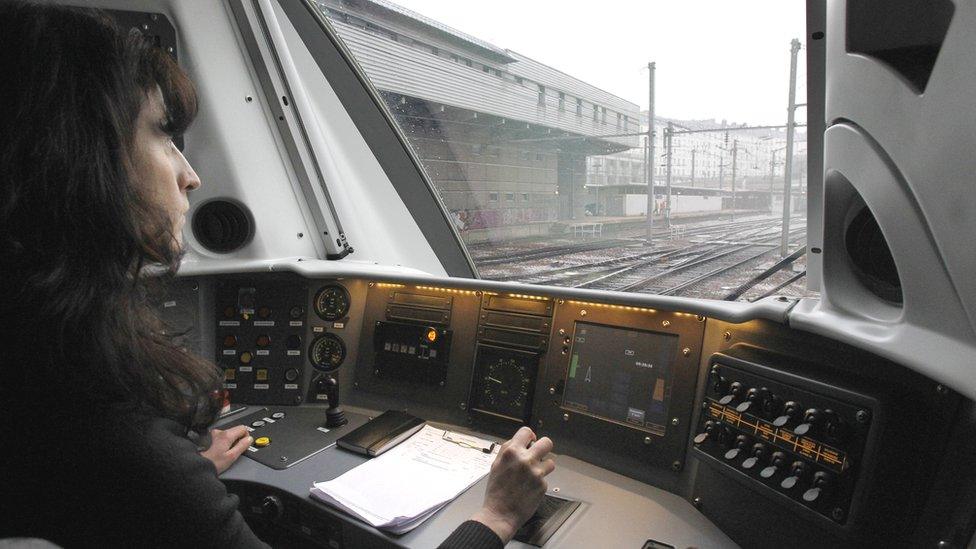
Most train drivers around the world are men
'I shouldn't need other women around to feel safe'
Hannah Merrin, 32, has been a train driver and instructor for over ten years. She works for Hong Kong's railway giant MTR, in the concession for the new Crossrail line in England. 13% of Crossrail's drivers are female - more than double the industry average.
I got into the railway industry because my father worked there. When I started there were more than 80 drivers and only two of those were women. It was quite intimidating.
The majority of them did not have a problem, it was more like having a lot of uncles to look after you, but there were the odd few that did not like to have women around. I was a victim of bullying myself from a manager that made it perfectly clear that, as a girl, he did not want me there and would stop me from progressing.
I have seen female passengers getting off the train in a bit of state after being victims of harassment. I delay the train until somebody can come and meet them at the platform if they are really shaken.
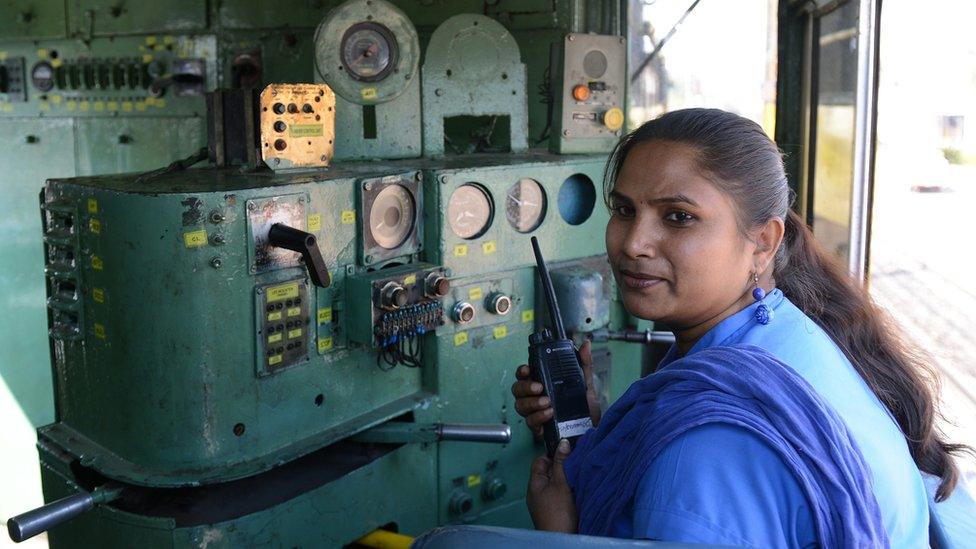
Indian Railways hires female locomotive drivers for its trains
I had a few drunken women, or some travelling late on their own, and when you are in that situation you are more vulnerable, so I make sure that I keep my eyes on them. There are no protocols on how to deal with abuse on the trains - I just do what I would like others to do if it were me.
I don't know if having other women behind the wheel makes women safer… I believe the only way to deal with harassment is by getting men who do it to just stop. I shouldn't need other women around me to make sure I'm safe.

Better drivers
Doris Muthoni Wanjira, 38, is a conductor in a "matatu" or minibus in Nairobi, Kenya. A recent photo of her carrying a baby while ushering passengers went viral; she received a wave of support on social media after the company suspended her for a week because of that.
If you don't have a godfather, relative or someone backing you, it is really hard to get a vehicle if you are a lady. Women have to work three times as hard to make a space for themselves.
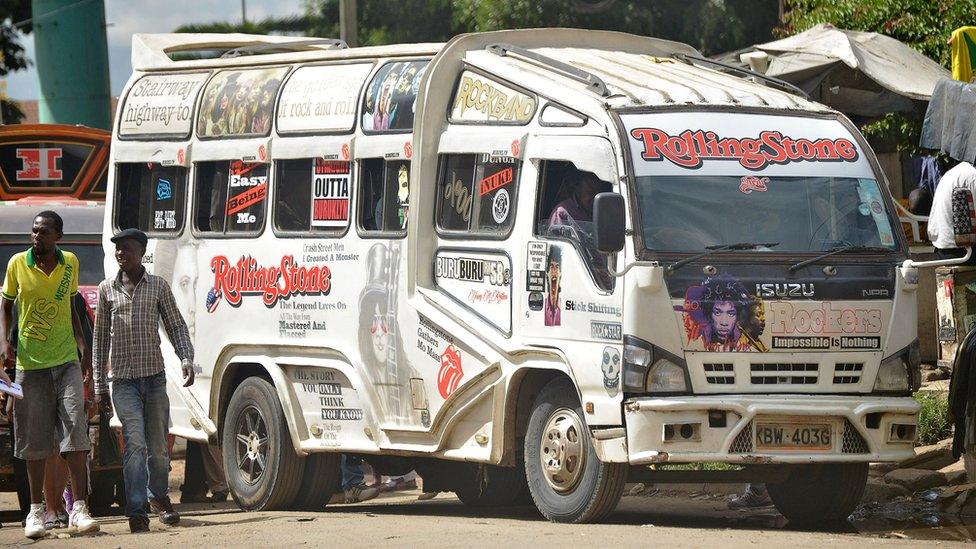
Heavily-decorated 'matatus' or minibuses are the transport of choice for around 90 percent of all commuters in Nairobi. Few of them have female drivers
What happens to female conductors is that some vehicle owners will take advantage of your desperation [to have a job or earn a wage]. And passengers and drivers in the matatus have to go through hell: they are sexually harassed, many assume we are "prostitutes".
With the conductors, some [male passengers] go as far as not paying the fare and when we confront them we are verbally and physically abused.
But I think it is important that we are seen doing these jobs, it gives other women hope that we can do the same jobs as men.
Women feel encouraged when they see us fighting for our space in the matatu industry. And to be honest, women are much better drivers than men. We go slowly but we still meet the targets and many female passengers like travelling with us because we know how to make it easier for them to board or alight and we treat them nicely.
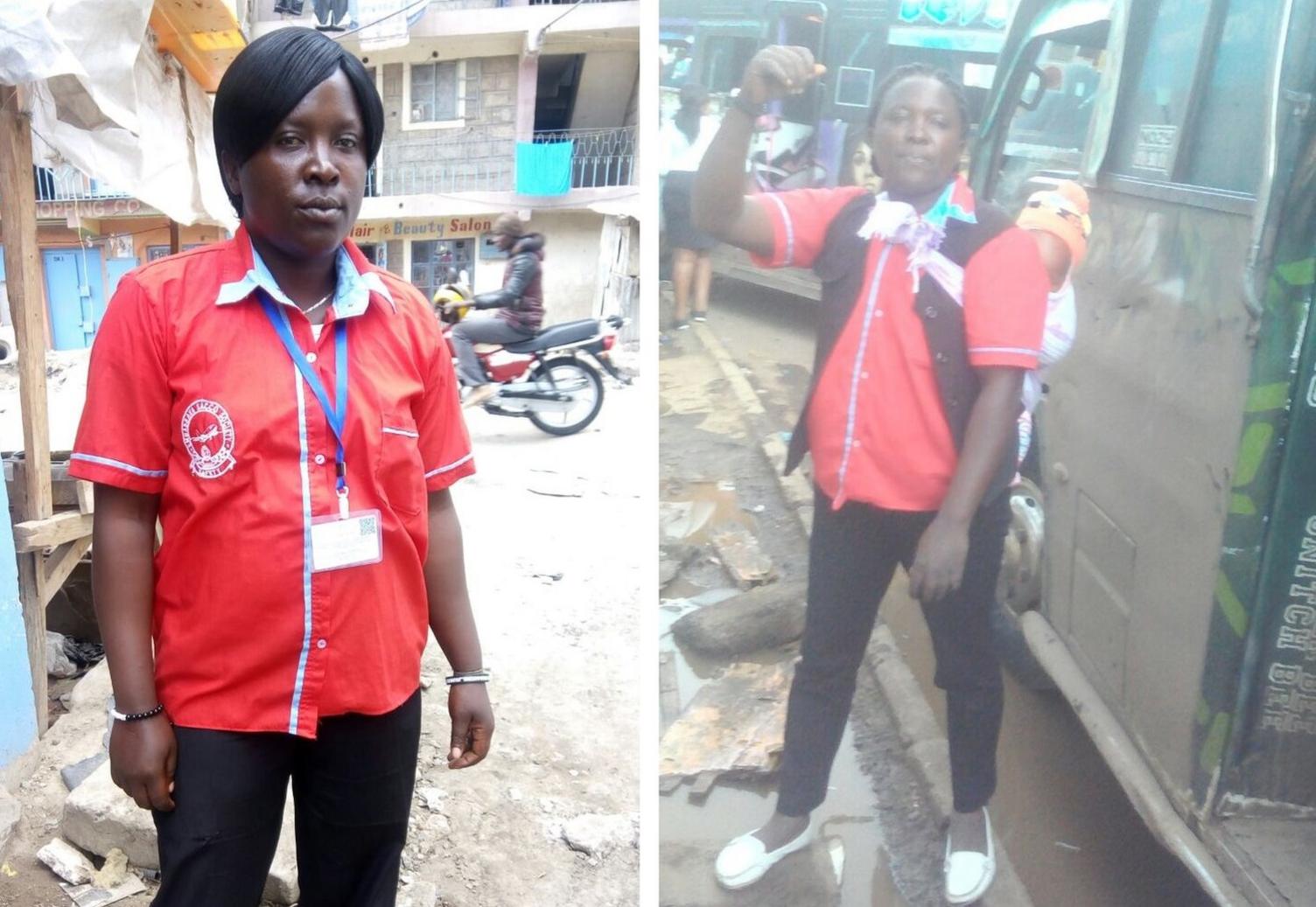
Doris Muthoni wearing her uniform (left) and ushering passengers as she brought her baby to work in the photo that went viral
When I see a woman being harassed, I always try to protect her. No-one has the right, it doesn't matter what she's wearing because her dress is her choice.
We need unions to cover us, we need job security because we keep silent in the face of abuse out of fear. Let us be trained in self-defence, let us have a lawyer that fights for us. Let us be safe and be respected.

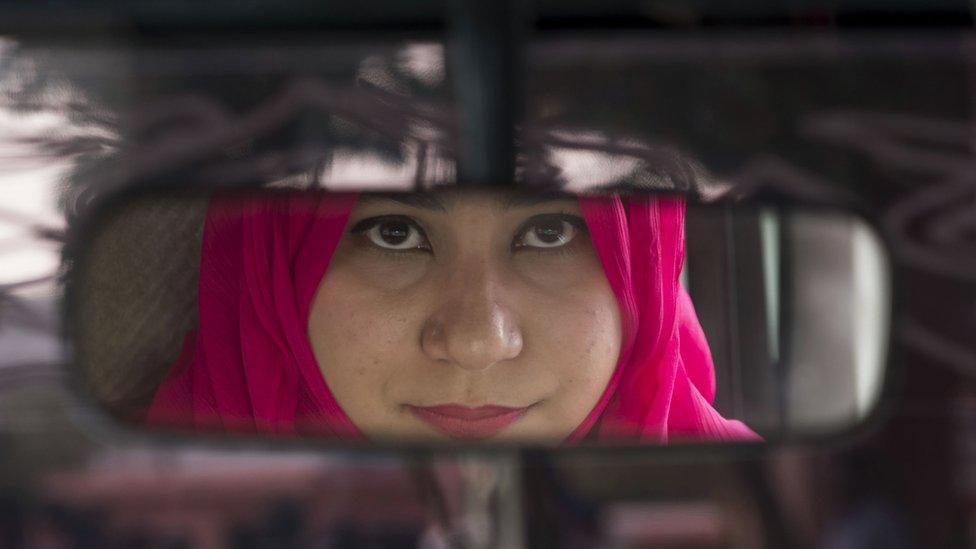
A driver with a women-only cab service in Pakistan: many countries have introduced 'pink taxis', driven by and for women


What is 100 Women?
BBC 100 Women names 100 influential and inspirational women around the world every year. In 2017, we're challenging them to tackle four of the biggest problems facing women today - the glass ceiling, female illiteracy, harassment in public spaces and sexism in sport.
With your help, they'll be coming up with real-life solutions and we want you to get involved with your ideas. Find us on Facebook, external, Instagram, external and Twitter, external and use #100Women

Safe space and empathy
She Drives Us is a mobile app that has just launched in Chile to create a gender-segregated transportation network - it has been labelled the "Uber for women", with 2,500 registered customers and almost 900 drivers.
"The app is a new alternative that gives female passengers the option to travel with female drivers only, and this is very reassuring for both," says Macarena Oyarce, a 30-year-old driver working with She Drives Us.
"It creates a safe space and allows women to find someone behind the wheel that better understands them, and with whom they can develop a lot more empathy."
"Harassment reports led us to look at an alternative business model for the car-sharing industry and ultimately to create this solution," says Esteban Torres, one of the three (male) founders of the service.
"If you look at abuse statistics, the picture is very bleak, in Chile as well as elsewhere in the world,"
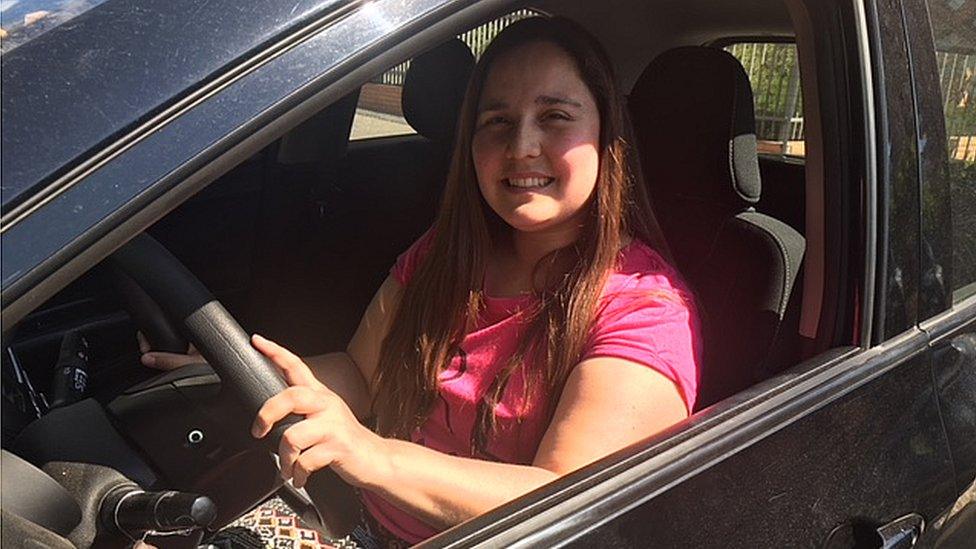
Macarena Oyarce is one of some 900 female drivers offering services via the She Drives Us app
"The benefit is two-fold: women can choose the service to travel safely, and it is also a good job opportunity for women who cannot work full-time."
The drivers believe it is good they are in charge.
"Of course it is a good solution to have women behind the wheel to fight against sexual harassment. This is about stopping harassment for women in the back seat as much as for those of us driving," says 34-year-old driver Carmen Gloria Urrutia.
"Statistics show that women are better drivers and have fewer accidents. Plus statistics also say that female-to-female harassment rates are extremely low," says Torres.
"I have a daughter and if I am going to let her travel alone I would much rather have her driven around by a woman."
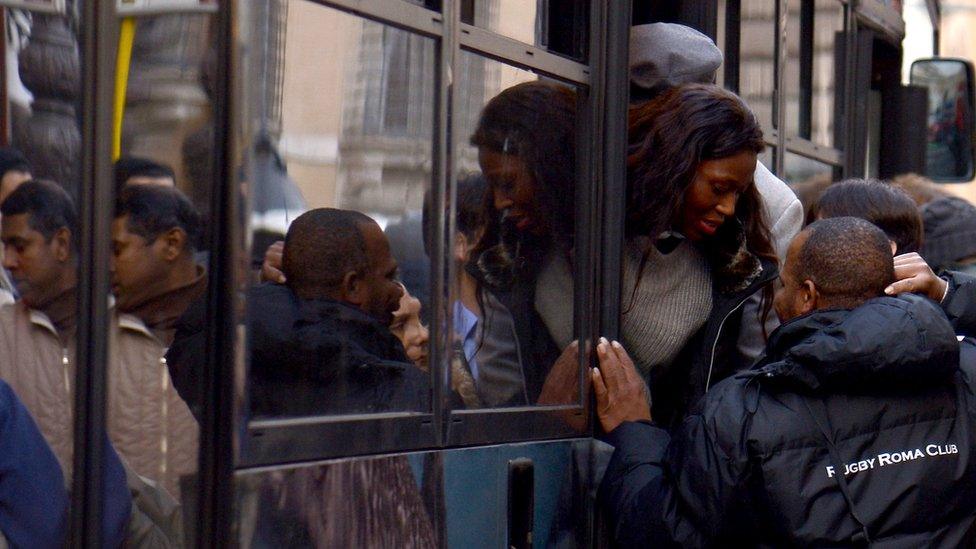
Crowded public transport: a hotspot for harassment

'Think twice, are you sure that was harassment?'
Tamara De Anda is a Mexican journalist and blogger. She made headlines for filing a police report against a taxi driver who accosted her verbally and got him fined for catcalling, following a rarely-applied regulation in Mexico City. She is a popular voice in the fight for gender-equality.
We need to see a more gender-balanced representation behind the wheel but also in those spaces where transport policies are made. As this is not a type of violence that men themselves have experienced, it is all very abstract to them to the point that they are sometimes unable to recognise it.
That's why having women in decision-making positions is an imperative if we want to see any progress.
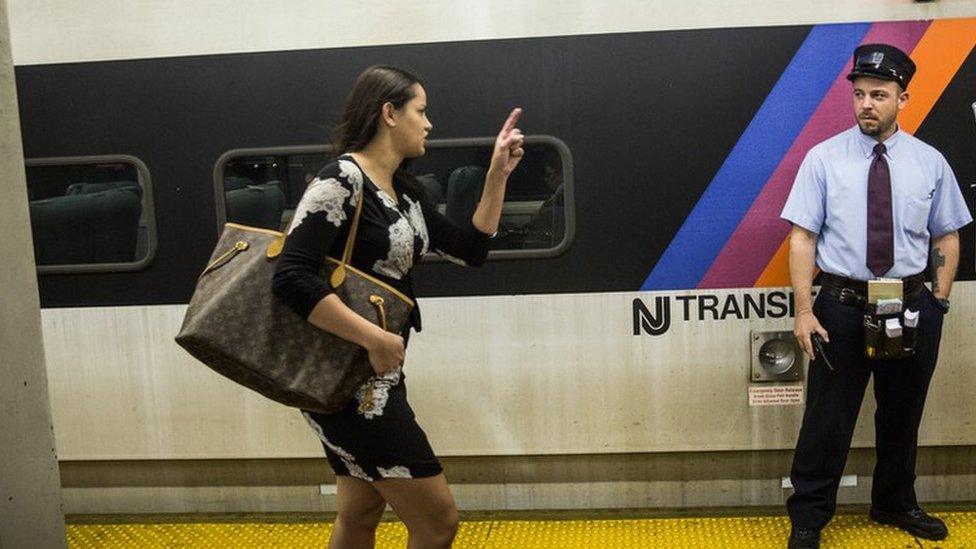
Not just drivers: we also need more female conductors and station guards, says feminist activist Tamara De Anda
On the transport network, the closest figure to an authority that you have is the driver or conductor. And there are very few females doing these jobs - probably because those who hire drivers are usually men and there are lots of prejudices against female drivers. Here, prejudice is such that some people would cancel a service if they call a taxi, for example, and the driver that arrives happens to be a woman.
In Mexico, a striking majority of station guardians and policemen are men and they dissuade you from reporting harassment.
If you go and tell them, many would tell you "think twice, are you sure that was harassment?", "do you really want to spend half a day at a police station to report it?"
It is very discouraging.
So it would certainly help to have women there too.
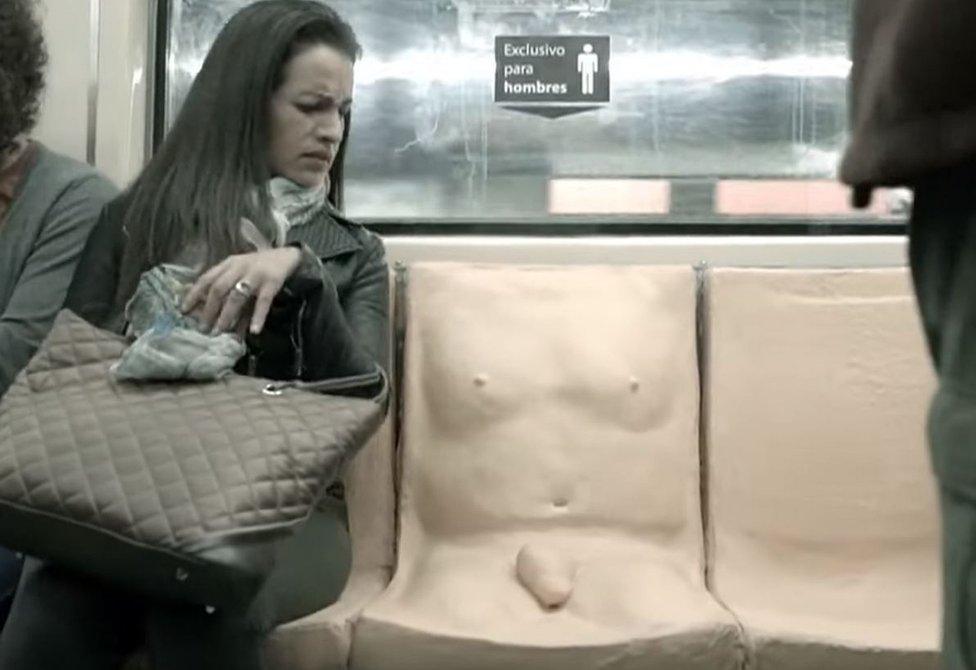
A campaign on Mexico City's public transport sparked debate earlier this year after displaying a "penis seat" to highlight sexual violence that women suffer on their daily journeys

Not just drivers
Sade Agboola, 35, founded private taxi company Annisa Cars, that hires only female drivers and is about to go into business in south London, UK.
We decided to recruit women drivers for our minicabs but this is not a solution, it is reaction to what is happening. This is a response to a problem that we have to address.
We are not trying to single out men nor do we believe that they are men guilty, but we have to address the issue. As a mum-of-one I use a lot of minicabs myself and there were a lot of situations in which I felt uncomfortable and nervous, especially when I was alone with the driver.
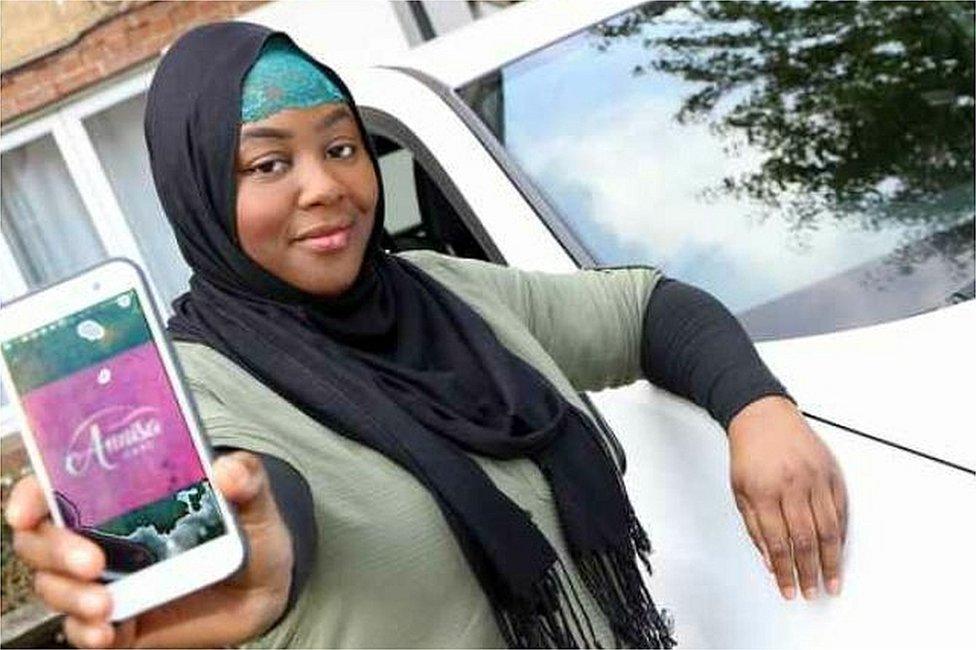
Sade Agboola is recruiting more female drivers to launch her private car hire company
Having a women-only taxi service is a way to empower women. Some feel very anxious just at the thought of having to leave their home.
However big or small the incident of abuse that they went through is, the result is always the same: they have to find a way to go back to living a normal life. I don't think [harassed] women receive enough support. To those that have gone through something really traumatic, we need to give them their confidence back.
So our drivers are not just drivers, they can be escorts to help them feel safe. They provide additional support that other women may need. Nobody should feel uncomfortable.
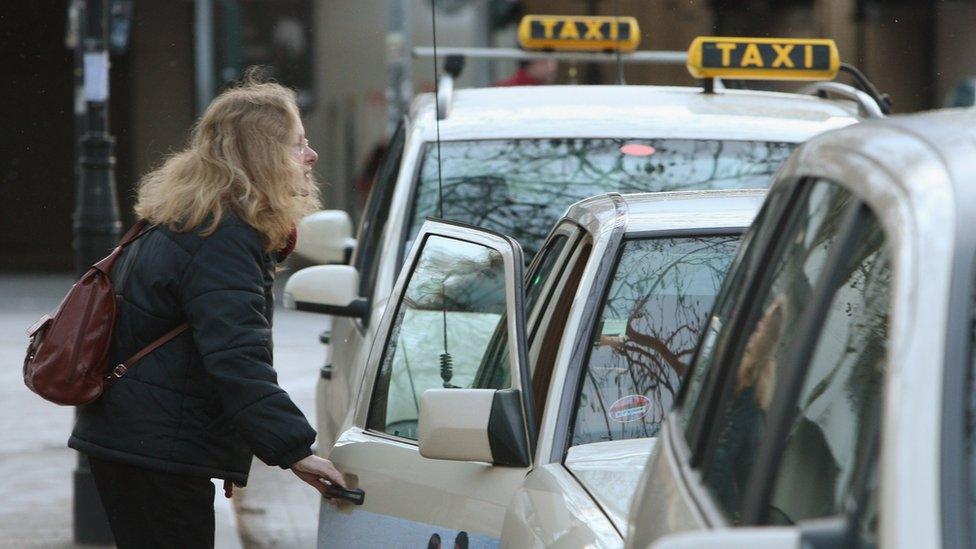
Being alone in a taxi with a male driver can feel intimidating for some women

"Just another form of sex segregation"
Holly Kearl is an American activist and founder of the non-profit organisation Stop Street Harassment (SSH). She is the author of the book Stop Street Harassment: Making Public Places Safe and Welcoming for Women and helped establish International Anti-Street Harassment Week, in 2012.
When we talk specifically about public transit, the often-crowded environment allows some harassers to feel emboldened: they may think they can get away with their behaviour because it's too crowded for the target of the harassment to know who did it.
And that doesn't change, regardless of who's driving.
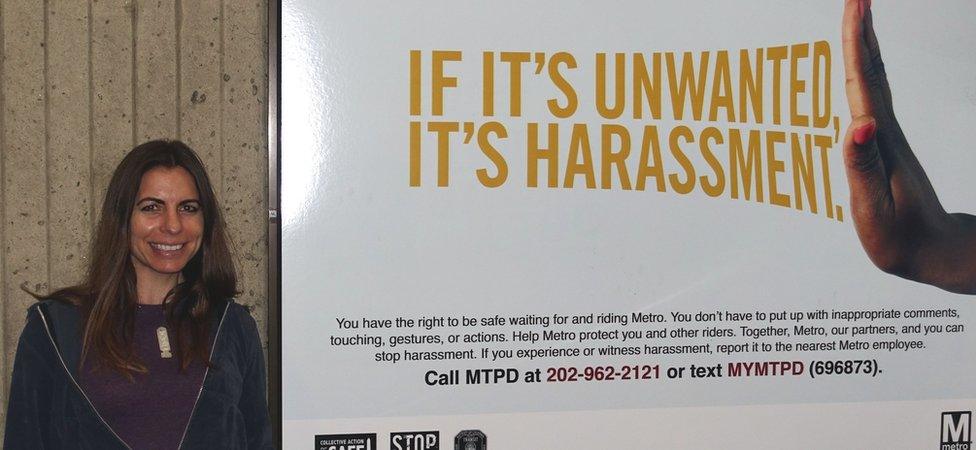
"The close proximity in public transport can make abusive behaviour like grabbing someone or ejaculating onto them easier to do than in other contexts", says campaigner Holly Kearl
I do believe women are safer while in a vehicle driven by a woman, but ultimately these measures are a form of sex segregation and they put the onus on women to have to try to stay safe. It turns women into the "other" and it almost feels like it excuses a harmful behaviour by creating this alternative option.
I'd like to see all taxi and ride-sharing companies do more to prevent their drivers from being harassers and abusers in the first place, as well as seeing them hire more women drivers in general.
We need education in schools, awareness campaigns and community training programmes to help witnesses and victims of harassment know what they can do in a situations. We need more initiatives that focus on addressing the root causes so that sex-segregation is not needed as a temporary "Band-Aid fix".
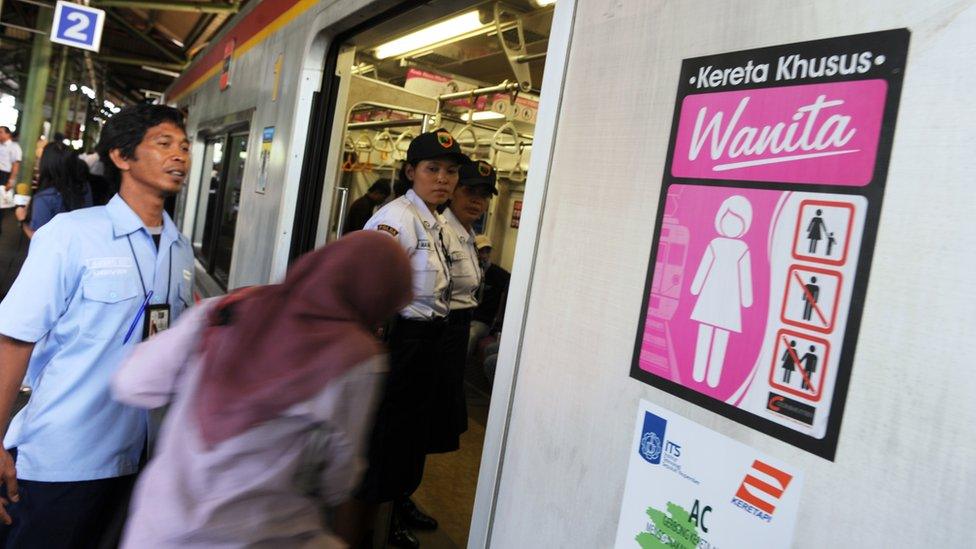
Women-only carriages, introduced as an anti-harassment measure in many countries - in the picture, Jakarta, Indonesia-, have sparked controversy

Not very helpful
Hanne Bingle, 58, became a tube driver in the London Underground in 2001. Born in Denmark, she has always worked to promote equality for women in Transport for London (TfL) and was granted a Honorary MBE for her services in 2009.
When I first trained to become a Tube driver, there was a little bit of scepticism from some of the (male) drivers but within a very short time things changed. We got to know the guys and it became more about team work. I used to work in the Victoria Line and at the time we had one of the highest percentages of women, but still not very high - around 13% of all drivers, I think.
There has been a steady improvement since then. There is something very positive about women in non-traditional roles, the fact that we can show that we are just as capable as anybody else to do the job. It is a very viable career choice for women.
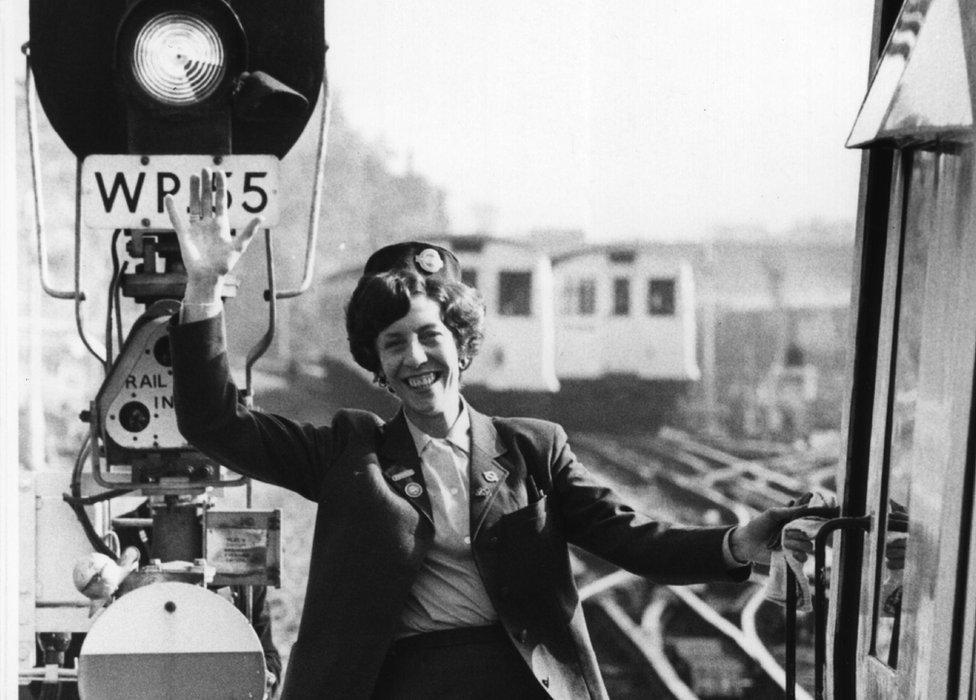
Ann Dodds was London Underground's first woman driver, in 1978
As a driver, you always get the odd guy with a little bit of an attitude when the Tube is not working as they expect, but if I am in my compartment they have no reason to come and speak to me.
When it comes to helping other women, being at the front of the train means that you are limited in what you can do, it may not be very helpful in fact. But people can call us through the emergency system and we can go or direct staff to come and help them.
On one occasion, we had an incident that ended with the perpetrator being taken to court. It was during the afternoon, myself and a fellow passenger intervened and we got him arrested by the police at a station.

Women's political participation is needed
Laura Capobianco is Global Adviser on Safe Public Spaces for UN Women.
Ensuring that public transportation is free of sexual harassment and violence against women and girls should not be regarded as "just a women's issue" and cannot be simply reduced to a discussion of one measure.
Safe and sustainable transportation requires looking at women's political participation - that is, women's views informing public transportation solutions: often issues related to gender and violence against women remain invisible as planning and design of public transportation systems are often predominated by men.
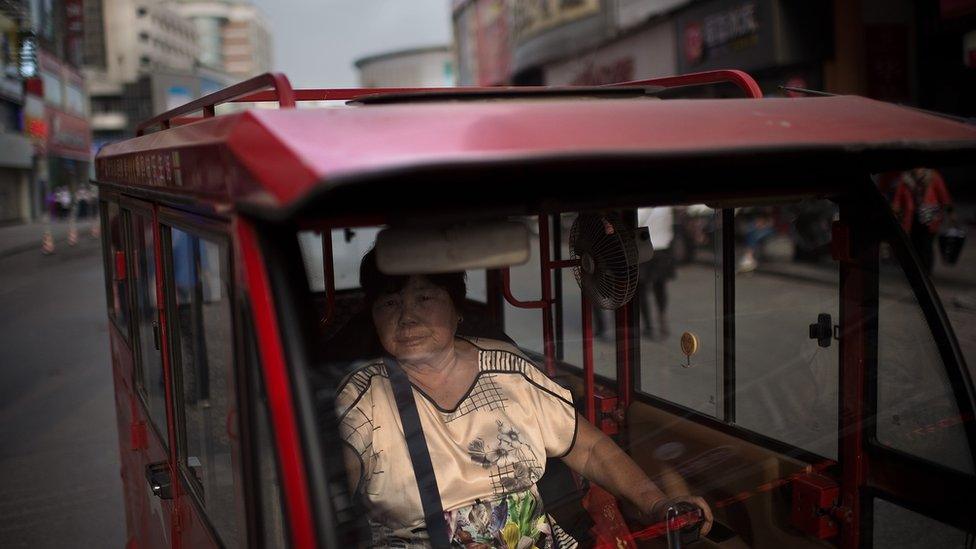
UN safe transport programmes include training for men and women drivers on how to deal with and report sexual harassment
Also it requires women's economic empowerment, in recognition that women may often avoid certain public spaces or routes because of fear of sexual violence, and this may limit women's autonomous mobility to get to work or to study.
Some of UN Women's programmes in this area include training for men and women drivers (taxis, rickshaws, buses, trains) on the issue of sexual harassment against women and girls, how to prevent and respond to it.
In certain countries, women-only (segregated) or women-led transportation may also work, as an affirmative interim or "emergency" measure to enhance women's safety and mobility in the process of ensuring safe public transportation.